Phalgun Shuddha Chaturdashi, Kaliyug Varsha 5111
By Riaz Sohail, Karachi (BBC News)
The kidnap and murder of a Hindu engineer in Pakistan’s southern province of Sindh has increased the insecurity among fellow Hindus. Garish Kumar disappeared last month near Hyderabad city, 250 km (160 miles) from the port city of Karachi in Sindh. His dismembered body parts were later found near a madrassa (Islamic religious school).
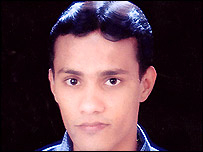 Wealthy Hindus like Garish Kumar are targets for kidnappers |
Police initially said the crime was committed by an outlawed Muslim militant group. Five people were arrested. However, Hyderabad’s police chief, Shaukat Shah, the incident now seems to be a simple kidnapping for ransom case.
Minority report
Kumar’s father, Saspal Das, is a trader from Kunri town in Sindh’s central district of Umerkot. "No one listens to the Hindu minority," he complains. ""We have no security. We are targeted because we are Hindu. There is no other reason for kidnapping Garish."
Pakistan is home to some 2.5 million Hindus, 95% of them living in the southern Sindh province. Most are poor, low-caste peasants.
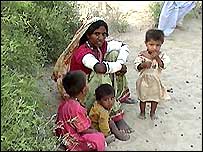 Most Hindus are poor peasants and serve as bonded labour |
However there are also some successful upper caste businessmen. In Sindh, they are a hot commodity for bandits. They lack the protection afforded to local tribal Muslims.
Whole tribes often go to war with one another in rural Sindh over any slight to their members. That cushion is not available to the Hindu minority.
Protection money
In recent years kidnapping for ransom and armed robberies have multiplied in the area and Hindus have increasingly been the focus of attacks.
Many pay protection money regularly to local gangs or influential figures. But in spite of this they are still targeted.
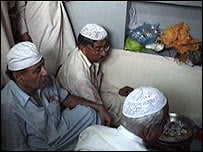 Hindus have to pay thousands of pounds to avoid kidnapping |
Santosh Kumar, a rice trader from Larkana town in upper Sindh, and his two brothers were kidnapped in separate incidents in 2006. They were later released after paying a huge ransom.
Another wealthy trader from the nearby city of Sukkur in Sindh, Sundeep Kumar, was kidnapped in 2005. He was released after paying a ransom of over a million rupees ($16,000), according to local sources.
The ransom can sometimes go up to five times that amount. But not all Hindus are as rich as Sundeep Kumar.
Last August, a youth, Ramesh Lal, was kidnapped. His relatives could not afford the ransom, and his body was later found at a police check post. In the last three years at least five Hindu traders have been killed after being kidnapped or offering resistance.
"Powerful oppress the weak"
Ramesh Lal, a Hindu MP in Pakistan’s parliament says, "The Hindus are not as rich as portrayed. Often the kidnappers ask a huge amount that the families cannot pay. As a result the hostages are killed."
The President of the Hindu council in Sukkur district, Mukhi Aishwar Lal says, "the powerful always oppress weaker communities… Hindus are weak so they are targeted."
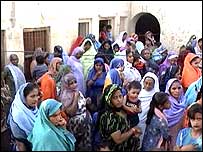 Even Hindu women and children are not spared by the kidnappers |
He relates how a few years back a Hindu family travelling by local bus were kidnapped by local bandits, while rest of the passengers were allowed to go.
Around that time some foreigners were also kidnapped in the same area. The police secured their release without any payment, but the Hindus were released after a huge ransom was doled out.
Such incidents increase the feeling among Hindus that they have no say in power and authority in the country.
Political apartheid
In Pakistan’s political system, the minorities, such as Hindus, Christians and Sikhs, remain outcasts despite represented in every major political party.
After Gen Pervez Musharraf seized power in 1999, he scrapped the controversial separate electorate system introduced former dictator Gen Zia-ul-Haq in 1980s.
Under the separate electorate system, non-Muslims could only vote for candidates of their own religion. Seats were reserved for minorities in the national and provincial assemblies.
Critics said Muslim candidates no longer had any incentive to pay attention to the aspirations of the minorities.
Gen Musharraf hoped to reverse that by the simple step of abolishing the system. But that appears to have failed.
Sudham Chand, a Hindu community leader who led a local campaign to scrap the separate electorate system was killed in broad daylight. His murder conveyed many a message. The killers were not arrested. His brother later migrated to India.
Ramesh Lal, a member of the National Assembly, says that the restoration of the conventional electoral system is of little use if the minorities have no security.
And still, he complains, no one asks the minorities what problems they are suffering.
Losing faith
Mukhi Aishwar Lal agrees that Hindus in Sindh are still afraid. They are frightened to move outside freely. Some even put themselves under a self-imposed curfew after 2000 hours a few months ago.
"No-one is targeting the minorities," argues Kishanchand Parwani, Advisor for Minorities’ Affairs to the Sindh Government.
But he admits that, although the minorities are supposed to be equal citizens according to the constitution, the reality is different. He accepts that they feel like second class citizens.
Garish Kumar’s father, Saspal Das, still retains faith in the system: "I will fight till I get justice for my son."
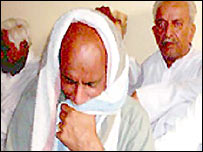 Garish Kumar’s grieving father, Saspal, wants justice |
But many Hindu families who stayed in Pakistan after partition have already lost faith and migrated to India.
Source: BBC UK






